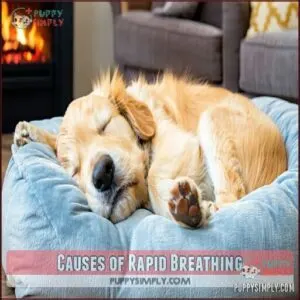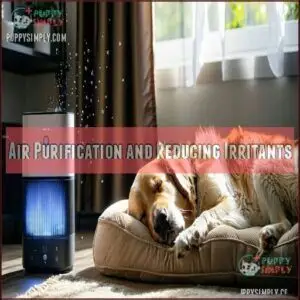This site is supported by our readers. We may earn a commission, at no cost to you, if you purchase through links.

This rapid breathing, sometimes called "sleep tachypnea," is often normal during REM sleep when your furry friend is dreaming of chasing squirrels or enjoying a tasty treat.
The normal respiratory rate for dogs at rest is 10-35 breaths per minute, though puppies and small breeds typically breathe faster.
You should be concerned if rapid breathing is accompanied by blue gums, excessive panting when awake, or difficulty breathing.
Like humans tossing and turning through nightmares, your dog’s sleeping patterns reveal much about their overall health and comfort.
Table Of Contents
- Key Takeaways
- Normal Dog Breathing Rates
- Fast Breathing While Sleeping
- Causes of Rapid Breathing
- Assessing Breathing Difficulty
- Monitoring Breathing Patterns
- When to Worry About Breathing
- Helping Dogs Breathe Easier
- Seeking Veterinary Care
- Frequently Asked Questions (FAQs)
- Why is my dog breathing fast during sleep?
- How to understand why dogs breathe fast while sleeping?
- Is fast breathing a symptom of a health condition in dogs?
- How fast should a dog breathe while sleeping?
- How do you know if your dog is having trouble breathing while sleeping?
- Is it normal for dogs to breathe fast while sleeping?
- Why is my dog taking short quick breaths?
- When to be concerned about dogs breathing?
- How do you calm a dog’s breathing fast?
- What if my dog has fast breathing?
- Conclusion
Key Takeaways
- Your dog’s fast breathing during sleep is often normal during REM cycles (10-35 breaths per minute), when they’re likely dreaming about chasing squirrels or enjoying treats.
- You should be concerned if rapid breathing comes with symptoms like blue/pale gums, excessive panting when awake, lethargy, coughing, or difficulty breathing.
- You can monitor your dog’s breathing rate by counting chest movements for 30 seconds and multiplying by two, establishing a baseline to help identify abnormal patterns.
- You’ll help your dog breathe easier by maintaining good air quality, providing cooling options during hot weather, and reducing anxiety through consistent routines and comfort measures.
Normal Dog Breathing Rates
When your dog is resting peacefully, its breathing should be steady and within a normal range of 10-35 breaths per minute, depending on its age and size.
A healthy sleeping pup breathes steadily at 10-35 breaths per minute—your guide to peaceful doggy dreams.
Understanding these rates lets you spot what’s normal and when something might be off.
Factors Affecting Breathing Rates
A dog’s breathing rate during sleep can vary due to age and size, exercise intensity, hydration levels, pain management, and medication effects.
Puppies might breathe faster, reflecting their higher metabolism and active sleep cycles.
Exercise or dehydration also impacts respiratory rate.
If your dog’s breathing fast while sleeping, consider their recent activity, overall health, and any potential medication side effects.
Breed Characteristics and Age
Not all breeds breathe the same. Puppies naturally breathe faster, given their playful dreams.
Senior dogs might’ve slower, more labored breathing due to age-related changes.
Brachycephalic dogs, like pugs, often face unique challenges like shallow or noisy breaths. Breed characteristics and age shape respiration, so it’s wise to keep an eye on these quirks, especially during sleep.
Measuring Respiratory Rate
Understanding your dog’s breathing rate while sleeping is easier than you think.
Wait until they’re in a calm sleep stage, then count chest movements for 30 seconds and multiply by two.
For accurate timing, use a timer, and check gums for color.
Labored breathing can indicate dyspnea.
Establish a baseline with video recordings during different dog sleep cycles to monitor changes and understand breathing patterns.
Fast Breathing While Sleeping
You’ll likely notice your dog’s breathing quickens while they’re sleeping, which can range from normal dream-related patterns to potential health concerns.
Dogs often breathe faster in sleep—sometimes it’s just chasing dream rabbits, other times it signals health issues worth watching.
While healthy adult dogs typically breathe 10-30 times per minute during sleep, factors like dreams, temperature, and underlying medical conditions can influence their respiratory rate.
Dreaming and REM Cycle
Just as we experience different sleep phases, your dog’s rapid breathing during sleep often happens during REM sleep when they’re actively dreaming.
During these dream-filled moments, you might notice:
- Increased respiratory rates up to 20-30 breaths per minute
- Twitching paws or "running" movements
- Soft whimpers or barking sounds
- Flickering eyelids or visible eye movement
- Temporary sleep paralysis (a normal protective mechanism)
These REM sleep behaviors typically last 2-3 minutes and are perfectly normal aspects of dog sleep cycles.
Heat and Cooling Down
While dogs dream about chasing squirrels, environmental heat can also explain why your furry friend is breathing fast while sleeping.
Your dog’s cooling system works overtime when temperatures rise, as they don’t sweat like humans do. Consider providing a cooling bed and ensuring shade availability, especially for breeds with higher heat sensitivity.
Proper hydration is essential, and a cool sleeping environment prevents heatstroke risks.
Watch carefully—heavy panting during sleep in hot conditions requires immediate attention.
Anxiety or Fear
During times of stress, your dog may breathe faster while sleeping due to anxiety or fear lingering in their mind.
Separation anxiety, noise phobias, and environmental changes can all trigger this response.
Dogs with past trauma often exhibit disturbed sleep patterns, including rapid breathing. You’ll notice your dog’s sleep behavior changes when they’re worried—their body remains on high alert, even at rest.
Calming techniques before bedtime can help. To address this, consider desensitization and counterconditioning.
Causes of Rapid Breathing
Your dog’s rapid breathing while sleeping can stem from various factors including medical conditions like heart disease or respiratory infections.
Environmental issues such as heat, or normal physiological processes like dreaming can also be contributing factors.
Understanding these potential causes will help you distinguish between harmless episodes and situations that require veterinary attention.
Health Issues and Medical Conditions
While your pup may simply be dreaming, rapid breathing during sleep can sometimes signal serious health conditions.
Medical issues that affect your dog’s breathing while sleeping include:
- Heart failure causing fluid buildup in lungs
- Lung diseases restricting oxygen flow
- Anemia causing the body to compensate for low oxygen
- Cushing’s impact on respiratory muscles
- Poisoning signs including abnormal breathing patterns
Watch for breathing problems accompanied by lethargy, pale gums, or coughing—these warrant a vet visit to rule out respiratory distress or sleep apnea.
Environmental Factors and Temperature
Throughout the year, your dog’s breathing patterns can change dramatically based on environmental conditions.
Heat often triggers fast breathing in sleeping dogs as they work to cool their bodies down.
| Environmental Factor | Impact on Breathing | What to Watch For |
|---|---|---|
| Ambient Temperature | Higher temps increase panting | Dog breathing heavy even while asleep |
| Ventilation Quality | Poor airflow worsens heat stress | Fast breathing dog sleep in stuffy rooms |
| Sleeping Location | Hot surfaces radiate heat | Sleeping dog panting on warm beds |
| Humidity Levels | High humidity reduces cooling efficiency | Labored breathing in muggy conditions |
| Seasonal Changes | Summer brings increased respiratory rates | More pronounced breathing changes during heat waves |
The table highlights various factors that influence a dog’s breathing, including ambient temperature, ventilation quality, sleeping location, humidity levels, and seasonal changes.
Each of these factors can contribute to changes in a dog’s breathing patterns, making it essential to monitor their behavior and adjust their environment accordingly to prevent labored breathing.
Breed Characteristics and Brachycephalic Breeds
Flat-faced dog breeds face unique breathing challenges due to their facial structure.
If you own a brachycephalic breed like Pugs or French Bulldogs, their shortened muzzles and smaller nostrils can cause breathing problems, even during sleep.
These breeds often suffer from brachycephalic syndrome, which includes an elongated soft palate that restricts airflow.
Their compromised respiratory systems make them particularly prone to rapid breathing while sleeping.
Assessing Breathing Difficulty
You’ll need to check both your dog’s breathing rate and quality to determine if there’s cause for concern.
You can spot serious breathing difficulties by looking for signs like labored chest movement, unusual breathing sounds, or changes in gum color from healthy pink to blue or pale, which can indicate labored conditions.
Labored Breathing and Other Symptoms
Recognizing labored breathing requires your careful attention to more than just rapid respirations.
Watch for your sleeping dog’s nostrils flaring, chest heaving, or unusual breathing sounds.
Pale gums, low energy, and a rapid heartbeat often accompany serious respiratory distress.
A distended stomach might indicate fluid buildup from heart issues.
If your dog’s breathing looks like a struggle rather than just fast, don’t wait to contact your vet, as it could be a sign of heart issues or respiratory distress.
Difficulty Breathing and Exercise Intolerance
Many dogs with breathing difficulties show reduced exercise tolerance before other symptoms appear. If your dog struggles during activities they previously enjoyed, it could indicate respiratory problems.
Five signs of exercise intolerance related to breathing issues:
- Tiring quickly during normal play
- Refusing walks or stopping frequently
- Excessive panting that doesn’t subside
- Reluctance to climb stairs or jump
- Collapse or weakness after minimal exertion
Treatment depends on proper diagnosis of the underlying causes, which is crucial for effective treatment.
Different Colored Gums and Poor Oxygen Delivery
Your dog’s gum color can be a window into their oxygen delivery system.
Healthy gums appear pink, while pale or white gums may indicate anemia or poor circulation.
Blue or purple gums (cyanosis signs) signal dangerous oxygen deprivation requiring immediate attention.
If you notice abnormal dog breathing while sleeping alongside unusual gum colors, don’t wait—these combined symptoms suggest serious respiratory distress or breathing difficulties that need veterinary care.
Heavy breathing at rest can indicate congestive heart failure, which may also be a sign of underlying breathing difficulties.
Monitoring Breathing Patterns
You’ll need to monitor your dog’s breathing patterns regularly to establish what’s normal for your furry friend.
This will help you detect potential health issues early by counting your dog’s breaths during deep sleep and tracking changes over time.
You’ll be better equipped to notice when something isn’t right, much like how you’d notice if your favorite clock suddenly started ticking too fast, which is crucial for identifying issues early, and taking action to ensure your dog’s health.
Counting Breaths and Calculating Rate
Counting your dog’s breaths accurately helps establish their normal breathing patterns.
To calculate your dog’s breathing rate while sleeping, watch their chest rise and fall for 30 seconds, then multiply by two.
Timing breaths during deep sleep (not REM) provides the most accurate counting.
For baseline establishment, repeat measurements several times when your pet is healthy.
Consider video recording their breathing for later reference or to share with your veterinarian.
Heavy breathing at rest can indicate underlying health issues, which may suggest underlying health issues that need attention, and it is crucial for establishing a baseline to monitor any changes in your dog’s breathing rate.
Monitoring Breathing Patterns Over Time
Tracking your dog’s breathing patterns over time creates a valuable baseline for spotting potential issues.
Keep a simple log of your pet’s breathing rates during sleep for several weeks, noting any pattern changes.
This long-term trend analysis helps you communicate effectively with your veterinarian if concerns arise, and rate variability is normal, but consistent deviations from established patterns may indicate underlying sleep disturbances requiring attention, which can be critical for effective communication.
Identifying Trends and Abnormalities
Vigilant pet parents become detectives when monitoring their dog’s breathing patterns over time. By tracking trends, you’ll catch abnormalities before they become serious issues.
- Document rate variations during different sleep stages
- Establish a baseline breathing rate during deep sleep
- Recognize pattern changes that persist for more than two nights
- Note any anomalies to communicate effectively with your veterinarian
Monitoring your dog’s breathing is crucial, and by following these steps, you can ensure you’re providing the best care possible, catching any serious issues before they become major problems.
When to Worry About Breathing
You’ll need to worry if your dog’s breathing rate consistently exceeds 35 breaths per minute while sleeping.
If you notice additional symptoms like coughing, pale gums, or unusual lethargy, it’s a cause for concern.
While an occasional increase in breathing might just be your furry friend chasing squirrels in dreamland, persistent fast breathing combined with other concerning signs warrants a prompt call to your veterinarian.
Rapid Breathing and Other Symptoms
Watching for concerning symptoms alongside your dog breathing fast while sleeping can help identify serious issues.
Pay attention to these key warning signs:
| Warning Sign | What It Means | When to Act |
|---|---|---|
| Pale/Blue Gum Color | Poor oxygen delivery | Immediate vet visit |
| Lethargy Signs | Underlying illness | Within 24 hours |
| Elevated Heart Rate | Cardiovascular stress | Same-day assessment |
Don’t ignore rapid breathing when it’s accompanied by appetite changes, abnormal body temperature, or dog labored breathing.
Fever, Cough, Vomiting, and Lack of Appetite
When rapid breathing is accompanied by other symptoms, it’s time to call your vet.
Fast breathing plus fever, cough, vomiting, or appetite loss indicates your dog’s body is fighting something serious.
Watch for these concerning combinations:
- Coughing and labored breathing, possibly indicating respiratory infection
- Fever with fast breathing, especially in puppies prone to pneumonia
- Vomiting alongside breathing changes, a common sign of illness
- Decreased appetite with lethargy and rapid breathing
- Persistent symptoms lasting more than 24 hours
New or Worsening Breathing Issues
Changes in your dog’s breathing patterns deserve close attention. When existing breathing issues worsen or new problems develop, it’s time to contact your vet.
| Warning Sign | When to Act |
|---|---|
| Sudden Onset | Immediately |
| Gradual Changes | Within 24 hours |
| Worsening Symptoms | Same day |
| Post-Treatment Issues | Contact vet now |
Medication side-effects can also cause dog breathing problems while sleeping. Think of breathing issues like engine warning lights—they rarely fix themselves and usually require professional attention. Contact your vet now if you notice any changes, as breathing issues can be a sign of a serious problem, and it’s always best to err on the side of caution with your dog’s health and wellbeing.
Helping Dogs Breathe Easier
You’ll find several practical ways to help your furry friend breathe more comfortably during sleep, from creating a cleaner air environment to managing stress triggers.
With simple adjustments to your dog’s sleeping area and daily routine, you can often reduce those midnight breathing concerns that have you watching the rise and fall of their chest instead of counting your own sheep.
You can make a significant difference by implementing these changes to improve your dog’s breathing comfort during sleep, ultimately helping you and your furry friend rest easier.
Air Purification and Reducing Irritants
When your dog’s breathing fast while sleeping, air purification can make a significant difference.
HEPA filters remove 99.97% of irritants like pet dander and hair that might trigger respiratory issues.
Consider investing in an air purifier with activated carbon filters to reduce VOCs from cleaning products that can worsen dog breathing problems.
Many owners find that using an air purifier for pets helps to improve their dog’s breathing.
Regular dusting and using pet-safe cleaners also helps minimize allergen exposure and chemical irritants that affect your dog’s health.
Cooling Down and Providing Comfort
Heat can transform your pup into a rapid-breathing furnace, even during sleep.
To help your dog maintain normal breathing patterns while sleeping, focus on cooling strategies:
- Place cooling mats or elevated beds in their sleeping area for better air circulation
- Keep fresh water available day and night to support proper hydration
- Choose breathable, lightweight bedding materials rather than thick, insulating options
Consider using a specialized cooling mat to help regulate their temperature.
Reducing Anxiety and Stress
After making your dog physically comfortable, consider addressing anxiety issues that might affect sleep breathing.
You can reduce stress with these proven techniques:
| Calming Techniques | Safe Spaces | Routine Importance |
|---|---|---|
| Thunder shirts | Quiet corners | Consistent bedtimes |
| Pheromone diffusers | Covered crates | Regular exercise schedule |
| Gentle music | Familiar bedding | Predictable feeding times |
Maintaining regular routines provides security for anxious dogs, while mental enrichment during the day promotes better sleep at night.
Remember, a relaxed dog breathes more evenly during sleep.
Seeking Veterinary Care
You’ll know it’s time to call your vet when your dog’s fast breathing during sleep is accompanied by symptoms like pale gums, labored breathing, or persistent coughing.
Don’t wait until your furry friend’s condition worsens, as early veterinary intervention can make the difference between a quick recovery and a serious health crisis.
Signs of Respiratory Distress
In the face of respiratory distress, recognizing warning signs can save your dog’s life.
Watch for labored breathing, pale gums, or noisy breathing that sounds like wheezing or whistling.
A distended stomach, low energy levels, and persistent rapid breathing while sleeping are red flags.
If your dog struggles to breathe, collapses, or develops bluish gums, don’t wait—these symptoms indicate serious breathing difficulties requiring immediate veterinary attention.
Emergency Situations and Urgent Care
Rush to the vet immediately when your dog shows critical symptoms of respiratory distress during sleep.
Triage urgency is vital when your pet experiences labored breathing or respiratory distress.
- Blue or pale gums indicating poor oxygen delivery
- Extreme difficulty breathing with extended neck or open-mouth breathing
- Collapse or loss of consciousness requiring CPR techniques
Don’t wait – immediate action saves lives when dog breathing quickly transforms to true respiratory distress.
Regular Check-Ups and Preventative Care
Regular veterinary check-ups are the cornerstone of preventative health care for your dog.
Schedule visits every 6-12 months to catch breathing issues early. Don’t wait for problems to develop—monitoring your dog’s normal breathing rate while sleeping establishes a valuable baseline.
Many owners prepare for their dog’s annual exam with specific products.
| Prevention Focus | Benefits | Frequency |
|---|---|---|
| Vaccination Schedules | Prevents respiratory infections | Every 1-3 years |
| Parasite Prevention | Reduces heart/lung complications | Monthly |
| Dental Hygiene | Improves airway health | Daily brushing |
The key to maintaining your dog’s health is through regular check-ups and preventative measures like vaccination schedules and parasite prevention, which can help prevent issues such as respiratory infections.
Frequently Asked Questions (FAQs)
Why is my dog breathing fast during sleep?
Nearly 70% of dogs experience rapid breathing during sleep phases.
Your dog’s fast breathing could be normal dreaming or REM sleep, but it might indicate health issues like heart problems if it’s persistent or severe.
How to understand why dogs breathe fast while sleeping?
You can monitor your dog’s breathing rate during sleep, noting if it exceeds 30-35 breaths per minute.
Dream activity is normal, but consistent rapid breathing may indicate health issues requiring veterinary attention.
Is fast breathing a symptom of a health condition in dogs?
Your dog’s panting like it ran a marathon in its dreams?
Yes, fast breathing can indicate health issues like heart disease, respiratory infections, pain, or anxiety.
You’ll want to consult your vet if it’s persistent.
How fast should a dog breathe while sleeping?
Your healthy adult dog should breathe 15-35 times per minute while sleeping.
Puppies breathe faster at 15-40 breaths per minute.
If you’re concerned, count chest movements for 30 seconds and multiply by two.
How do you know if your dog is having trouble breathing while sleeping?
Persistently panting pups display distress while sleeping.
You’ll notice labored breathing, unusual sounds, pale gums, or consistent rates above 35 breaths per minute.
Trust your instincts—if something seems off, it’s time to call your vet.
Is it normal for dogs to breathe fast while sleeping?
Some rapid breathing during sleep is perfectly normal for your furry friend.
It’s often related to dreaming or REM sleep cycles.
However, consistently fast breathing (over 30-35 breaths per minute) may indicate health concerns.
Why is my dog taking short quick breaths?
Like a nervous hummingbird, your dog’s short quick breaths may result from excitement, stress, pain, or medical issues.
You’ll want to watch for other symptoms and consult your vet if it continues.
When to be concerned about dogs breathing?
Be concerned if your dog’s breathing exceeds 35 breaths per minute at rest, shows labored effort, or produces unusual sounds.
You’ll also want to call the vet if it’s accompanied by pale gums or lethargy.
How do you calm a dog’s breathing fast?
Nearly 15% of dogs struggle with respiratory issues.
To calm your dog’s breathing, create a quiet environment, gently stroke them, and maintain a cool temperature.
If symptoms persist, contact your vet immediately.
What if my dog has fast breathing?
If your dog breathes fast, monitor their rate during rest (should be 10-30 breaths/minute).
Fast breathing can indicate stress, heat, dreams, or medical issues.
Contact your vet if it’s persistent or accompanied by other symptoms.
Conclusion
When Emma noticed her corgi breathing fast while sleeping, she worried until her vet explained it was normal dreaming behavior.
Remember, your dog’s rapid breathing during sleep is usually harmless, but trust your instincts.
If fast breathing comes with unusual symptoms like blue gums or excessive panting when awake, don’t hesitate to call your vet.
You know your furry friend best, and with proper monitoring and timely care, you’ll keep your dog breathing comfortably for years to come.


















